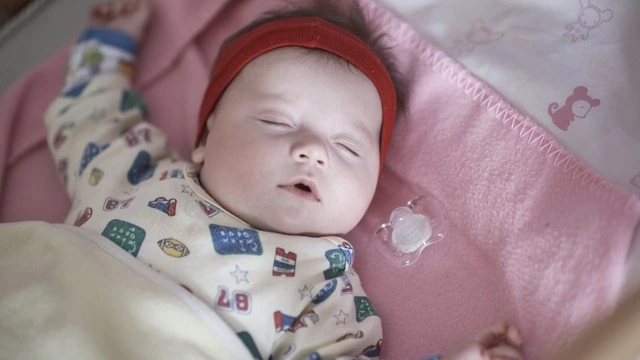Have you ever stared at your newborn, peacefully asleep one moment and then suddenly squirming or crying the next? You might’ve thought, Are they having a nightmare?
It’s a question almost every parent has asked. And, trust me, I’ve been there. Sleepless nights, endless Googling, and a lot of second-guessing myself.
But here’s the thing: understanding newborn sleep isn’t as complicated as it seems. While it can feel like they’re dreaming or even having bad dreams, the truth about infant sleep is a lot more fascinating—and less spooky.
Let’s dive in and learn about do newborns have nightmares? and find ways to make those nights a bit easier for everyone.
Understanding Newborn Sleep Patterns
Newborn sleep is weird. There’s no other way to put it. They’re on a completely different wavelength than us.
For starters, did you know newborns sleep up to 16 to 17 hours a day? Sounds dreamy, right? But the catch is they sleep in tiny chunks—two to three hours at a time.
I remember thinking, How is anyone supposed to survive this?
The main reason for these short sleep cycles is that newborns have two stages of sleep: REM and Non-REM Sleep Explained
REM (Rapid Eye Movement) sleep
During REM sleep, their little brains are buzzing with activity. This stage is critical for brain development, but it’s also when they’re more likely to twitch, grunt, or even let out a sudden cry. It’s almost like they’re practicing how to interact with the world—even in their sleep!
Non-REM Sleep
Non-REM sleep, on the other hand, is when they’re quieter and more still. But here’s the kicker: unlike adults, who spend about 20% of their sleep in REM, newborns spend about 50% of their sleep in this active stage. That’s a lot of dreaming time… or is it?
The reality is, scientists believe that newborns probably aren’t dreaming the way we do. Their brains aren’t developed enough to create complex narratives or visuals.
“It’s thought that very young kids, younger than four or so, generally don’t have fears at nighttime because they don’t developmentally know that there might be things to be afraid of,” says Pediatric psychologist Dr. Catrina Litzenburg of the Cleveland Clinic
So those twitches and cries? They’re likely just reflexes or responses to internal sensations—not nightmares.
Learning this was such a relief for me because, honestly, the idea of my baby having bad dreams broke my heart.
So now, let’s talk about what all those twitches and cries mean.

Do Newborns Experience Nightmares?
Let’s get straight to it: no, newborns don’t have nightmares. At least, that’s what the experts say. Nightmares require a certain level of cognitive development—like the ability to imagine scary scenarios—and newborns just aren’t there yet.
When my little one would suddenly cry out in their sleep, I’d panic. Was it something I did? Did they hear something scary?
Turns out, those cries were usually tied to basic needs or physical sensations. Hunger, gas, or even a loud noise can disrupt their sleep. It’s more like their body’s way of saying, Hey, something feels off! rather than reliving some terrible dream.
But here’s the cool part: the twitching, flinching, and even smiling you see during sleep. Those are signs of a healthy developing brain. It’s their nervous system doing a kind of test run, preparing their little bodies for all the milestones to come.
Knowing this helped me stop overanalyzing every noise and just focus on being there when they needed comfort.

If it’s not nightmares, though, what’s waking them up? Let’s dive into some common culprits.
Common Causes of Sleep Disturbances in Newborns
If it’s not nightmares, what’s waking them up? Oh boy, the list is long. Here are a few of the usual suspects:
- Hunger: Newborns have tiny stomachs, which means they need to eat often—day and night. It’s exhausting, but totally normal.
- Discomfort: A wet diaper, being too hot or cold, or even a scratchy tag on their onesie can be enough to wake them.
- Moro Reflex: Ever see your baby suddenly fling their arms out like they’re falling? That’s the Moro reflex. It’s a survival instinct they’re born with, but it can jolt them awake.
- Gas or Colic: Oh, the dreaded gas pains. I can’t count the number of nights I spent rocking and burping my little one, praying for some relief.
research shows that most sleep disturbances in newborns are linked to physical needs, as their sleep patterns are still developing and evolving.
Here’s a tip: if your baby is waking up crying, check the basics first. Are they hungry? Wet? Too hot? Once you rule those out, it’s usually something they’ll outgrow with time.

Tips to Soothe a Newborn During Sleep Disturbances
So what can you do when your baby seems restless? Over time, I’ve learned a few tricks that worked wonders for us:
- Swaddle Like a Pro: A snug swaddle can make a world of difference. It mimics the coziness of the womb and helps reduce the Moro reflex. Just make sure you don’t swaddle too tight—they still need room to move their hips.
- White Noise Machines: These are lifesavers. The gentle hum mimics the sounds they heard in the womb, creating a calming environment. Our favorite setting? Ocean waves.
- Dim the Lights: Keeping the room dark signals to your baby that it’s time to sleep. Use blackout curtains if you need to.
- Establish a Routine: Even newborns can benefit from a simple bedtime routine. A warm bath, a lullaby, and some quiet cuddle time worked wonders for us.
- Trust Your Instincts: Sometimes, no amount of tips or tricks will work, and that’s okay. Hold them, comfort them, and remind yourself that this phase won’t last forever.
Remember, “A sleeping baby is the new happy hour,” so cherish those rare, peaceful moments!
FAQs
Babies, especially newborns, likely don’t have nightmares at all. Their brains aren’t developed enough to create scary images or process fear into stories. What might seem like a nightmare—such as crying or sudden movements—is usually just a reaction to physical discomfort, hunger, or the Moro reflex.
If your baby appears unsettled during sleep, it’s best to let them be unless they’re truly distressed. Intervening unnecessarily could disrupt their sleep cycles. If they wake up on their own and need comforting, hold them gently, speak softly, and help them settle back to sleep.
No, it’s not normal for newborns to have nightmares because they lack the cognitive development to dream in the way older children or adults do. Their sleep behaviors are more likely linked to their developmental stages and physical needs rather than emotional fears.
Conclusion
Newborn sleep is full of mysteries, but one thing’s for sure: nightmares aren’t one of them. Knowing that your baby’s cries and movements are part of their natural development can take a huge weight off your shoulders.
So, focus on creating a cozy, comforting sleep environment and enjoy those sweet (if sleepless) moments. They won’t last forever.
And hey, if you’ve got tips or funny sleep stories, share them in the comments! We’re all in this together.









